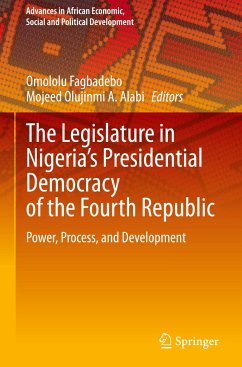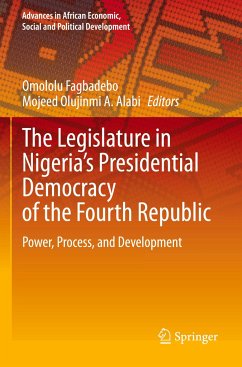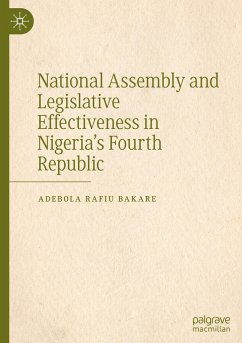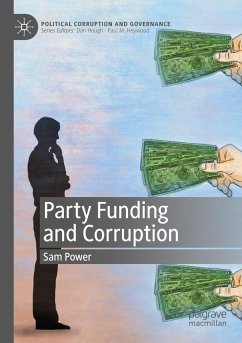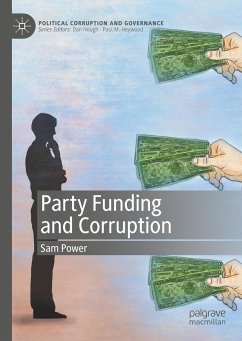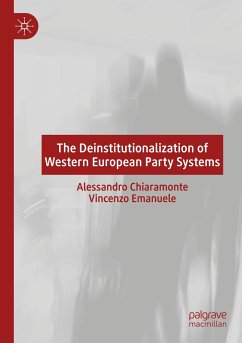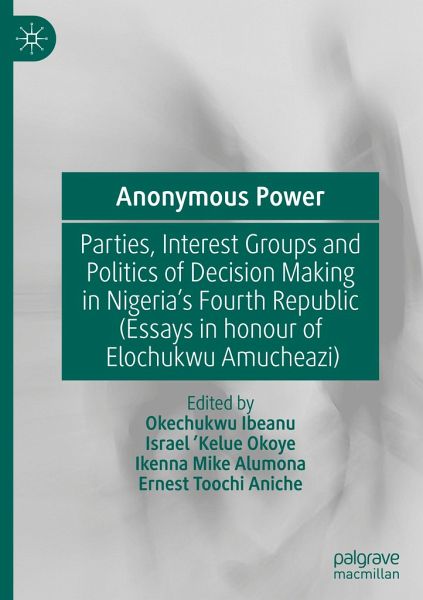
Anonymous Power
Parties, Interest Groups and Politics of Decision Making in Nigeria's Fourth Republic (Essays in Honour of Elochukwu Amucheazi)
Herausgegeben: Ibeanu, Okechukwu; Okoye, Israel 'Kelue; Alumona, Ikenna Mike; Aniche, Ernest Toochi

PAYBACK Punkte
53 °P sammeln!
This book examines the structures and processes of political decision-making and governance in Nigeria. Since Nigeria returned to elected government in 1999, it has been observed that several factors account for the differences between the design of statutory structures and processes of political decision-making and how they operate in reality. In other words, there are wide gaps between statutes and practice of political decision-making. However, the nexus between the two remains largely understudied by political scientists. Instinctively, political scientists assume that informal influences ...
This book examines the structures and processes of political decision-making and governance in Nigeria. Since Nigeria returned to elected government in 1999, it has been observed that several factors account for the differences between the design of statutory structures and processes of political decision-making and how they operate in reality. In other words, there are wide gaps between statutes and practice of political decision-making. However, the nexus between the two remains largely understudied by political scientists. Instinctively, political scientists assume that informal influences in political decision-making are aberrations, episodic or temporary.
This book is designed to interrogate the nexus between the formal and non-formal dimensions of the dynamics of political decision making in Nigeria and also provide evidence about the actual functioning of governmental structures in Nigeria.
The thesis of the book is that the non-formal dimensionof political decision making as evidenced in rising ethno-political patronages, religious sentiments, clientelism and factionalism, are interacting with formal decision-making structures in ways that largely undermine the latter and, by extension, the democratic system. The book pursues this thesis by examining the roles of actors and institutions including, electoral choices made by voters, legislations, which perhaps is the most fundamental form of political decision-making, policies made by the executive and administration, as well as decision making within political parties, since parties are sites for articulating and aggregating issues on which decisions are to be made.
This book is designed to interrogate the nexus between the formal and non-formal dimensions of the dynamics of political decision making in Nigeria and also provide evidence about the actual functioning of governmental structures in Nigeria.
The thesis of the book is that the non-formal dimensionof political decision making as evidenced in rising ethno-political patronages, religious sentiments, clientelism and factionalism, are interacting with formal decision-making structures in ways that largely undermine the latter and, by extension, the democratic system. The book pursues this thesis by examining the roles of actors and institutions including, electoral choices made by voters, legislations, which perhaps is the most fundamental form of political decision-making, policies made by the executive and administration, as well as decision making within political parties, since parties are sites for articulating and aggregating issues on which decisions are to be made.





